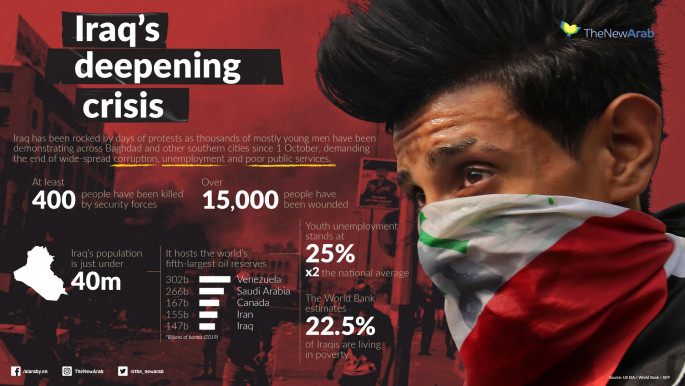Protesters close Iraq's bridges and roads amid PM nominations
Protesters in Iraq blocked roads and bridges Tuesday evening in outrage at the possible nomination of the Minister of Higher Education Qusay Al-Suhail to head the country's new government.
Anti-government demonstrators in the southern governorate of Basra, where Al-Suhail is from, protested against outgoing premier Adel Abdel Mahdi's potential replacement into the morning on Wednesday, The New Arab's Arabic-language service reported.
For over two months, Baghdad and the Shia majority south have been rocked by protests against the government and Iranian influence, rejecting in advance any politician from the "corrupt system" in place since the fall of Saddam Hussein in 2003.
Protesters burned tires in the streets and cut off the road leading to Rumaila oil field on Tuesday evening, while demonstrators in Basra's naval square chanted slogans calling for an independent prime minister.
Al-Suhail, who served as a minister in Abdel Madhi's government will be rejected by protesters, who demand an "independent" candidate.
Iraqi security services were extensively deployed in Basra, The New Arab reported, and managed to reopen one of the roads blocked by protesters early on Wednesday.
Baghdad's Tahrir Square also saw demonstrations, with protesters raising banners rejecting Suhail's candidacy for the position of prime minister.
|
Protesters told The New Arab that they reject Al-Suhail because of his close link with former Prime Minister Nouri Al-Maliki.
Meanwhile, protesters in Najaf Governorate erected a Christmas tree in Sadrin Square, bearing pictures and names of those killed in the anti-government demonstrations.
Read more: Iraq state forces 'complicit' in massacre of Baghdad protesters as violence escalates
Iraq's protest movement erupted on 1 October and was met with violent suppression, with some 460 people killed and 25,000 wounded to date.
Deadline looming
Iraqi political parties are struggling to reach a consensus on a new prime minister amid unprecedented protests as the deadline for a parliamentary vote loomed.
Iraq's competing factions typically engage in drawn-out discussions before any official decision, but replacing outgoing premier Abdel-Mahdi has been further complicated by the scrutiny of the months-old protest movement that forced his resignation.
Abdel Mahdi's resignation on 1 December was precipitated by a wave of violence against demonstrators and the intervention by top Shia cleric Grand Ayatollah Ali Sistani, whose influence looms large in Iraqi politics.
Abdel Mahdi continues to carry out day-to-day government business pending the naming of a new premier.
In an official letter made public late Sunday, President Barham Saleh said he'd received a letter from the speaker of parliament accepting Abdel Mahdi's resignation "on 4 December".
According to the constitution, parliament has two weeks to designate a new prime minister, making the deadline Thursday.
Several names circulated
In his own letter, Saleh asks parliament to tell him "what is the largest coalition" in the assembly, from which the new premier should theoretically come.
When naming Abdel Mahdi 13 months ago, parliament remained vague on the "largest coalition" and the premier was approved as soon as he was designated by Saleh.
The prime minister then formed his government with the support of two allies, now divided in their responses to the protest movement.
In one corner is the powerful Shia cleric Moqtada al-Sadr, who holds the largest bloc in parliament and supports the protesters calling for an overhaul of the political system.
 |
In the other is the bloc made up of veterans of the Hashd Al-Shaabi pro-Iranian paramilitary group now integrated into Iraqi security forces. Making up the second largest bloc, they see the protest movement as the product of a foreign "conspiracy".
Several names have circulated, including 49-year-old Mohammed al-Soudani, a former minister and ex-governor of a southern province. He has already been rejected by protesters, who demand an "independent" candidate.
Several sources told AFP Soudani's approval by parliament was "risky", with one saying "there is a big risk his candidature will be rejected".
Read more: Extreme inequality will fuel Middle East turmoil and uncertainty into the new year
Saleh "is betting on this rejection, so he can present the candidate of his choice" without needing parliament's approval, as the constitution stipulates, this source added.
Another complication in the negotiations is the unusual disassociation from the process of Sistani, 89.
While he has played kingmaker of Iraqi governments since 2003, Sistani said ten days ago that this time he intended to play "no role", only expressing a wish that the choice be made without "foreign interference".
Follow us on Twitter and Instagram to stay connected





 Follow the Middle East's top stories in English at The New Arab on Google News
Follow the Middle East's top stories in English at The New Arab on Google News
![Israeli forces ordered bombed Gaza's Jabalia, ordering residents to leave [Getty]](/sites/default/files/styles/image_330x185/public/2176418030.jpeg?h=a5f2f23a&itok=_YGZaP1z)

